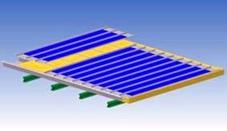Market Segment

September 15, 2013
Steel Solar Energy Technology Developed by ArcelorMittal
Written by Sandy Williams
A new generation of solar panels has been developed by ArcelorMittal. Instead of using glass plate, a thin semi-conductor coating is layered directly on steel substrate to produce electricity via solar radiation.
The photovoltaic technology using steel is more environmentally friendly process than solar modules using glass panels, said ArcelorMittal. The new technology will allow steel clad buildings and roofing to directly integrate renewable energy sources in building design.
The new development is part of the Phoster research program dedicated to roofing within the European Commission’s LIFE+ program that seeks to expand solar energy and reduce greenhouse gas emissions while promoting recycling. A four-year testing program of the photovoltaic product will be designed to demonstrate the feasibility and reliability of generating electricity through steel. (Source: ArcelorMittal)







